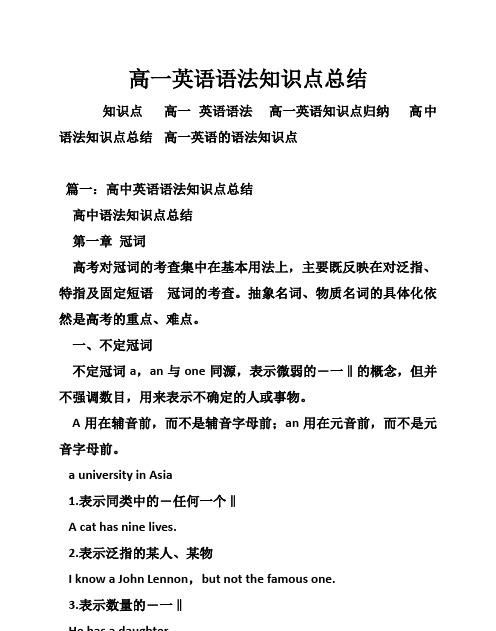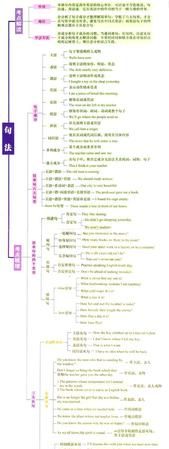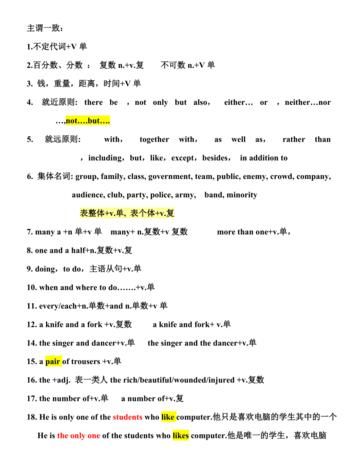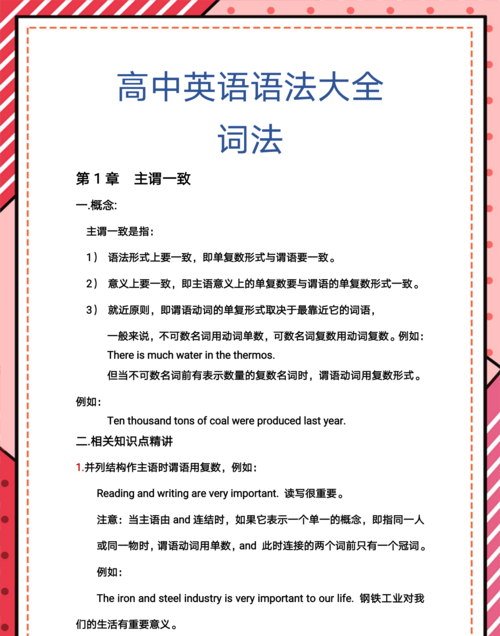本文目录
高一英语语法知识点总结思维导图
高考对冠词的考查集中在基本用法上,主要既反映在对泛指、特指及固定 短语 冠词的考查。抽象名词、物质名词的具体化依然是高考的重点、难点。下面给大家分享一些 高一英语 语法知识点,希望对大家有所帮助。
更多英语知识点相关内容推荐↓↓↓高一英语必修五测试知识点
高二英语 语法必考知识点 总结
高一英语必修二知识点梳理
高二英语选修六的必会知识点
高一英语语法知识点1
定语从句
1、that指人或物在从句中作主语,宾语或表语
which指物在从句中作主语,宾语或表语(作宾语时可以省略)
who指人在从句中作主语,宾语或表语
whom指人在从句中作宾语
whose指人或物在从句中作定语
as指人或物在从句中作主语,宾语或表语
but指人或物在从句中作主语,宾语或表语
注意:指物时,whose+名词=the+名词+ofwhich或ofwhich+the+名词
高一英语语法知识点2
as的用法
(1)常用于下列结构:such…as;so…as;thesame…as;as…as
注意:thesame…as表示同一类,不同一个
thesame…that表示同一个
(2)as与which的区别
a、位置不同
as可放在主句后,主句前或主句中间;which只能放在主句后。
b、as起连接作用,表达说话人的观点、看法,并指出主句内容的根据或出处,意为“正如,正像”。
Which相当于并列句,可以用andthis来代替,意为“这一点,这件事’”。
注意:as常用于下列结构:asweknow/asisknowntoall,asweallcansee,ashasbeensaidbefore/above,
asmightbeexcepted,asisoftenthecase,一般不能用which代替as。
c、在从句中作主语时,which既可作系动词be的主语也可作实义动词的主语,而as只可作系动词be的主语。
高一英语语法知识点3
只用that不用which的情况
1、.先行词为all,much,everything,nothing,something,anything,nothing,none,theone等不定代词时
2、先行词被only,any,few,little,no,all,just,very,right等修饰时.
3、当先行词是最高级或被形容词最高级修饰时。
4、当先行词是序数词或被序数词修饰时。
5、当先行词是数词时.
6、当先行词既指人又指物时。
7、如有两个定语从句,其中一个关系代词已用which,另一个关系代词则宜用that。
8、主句是Therebe结构,修饰其主语的定语从句宜用that作关系代词。
9、被修饰成分为表语,或者关系代词本身是定语从句的表语时,该关系代词宜用that。
10、先行词为what,关系代词用that。
11、有时为了避免重复而使用that引导定语从句。
高一英语语法知识点4
只用which不用that的情况
1、当介词放在关系代词之前时。
2、在非限制性定语从句中。
3、当关系代词指整个主句的概念时
高一英语语法知识点5
只用who不用that的情况
1、当先行词是one,ones,anyone或those时。
2、therebe结构中。
3、当先行词是人,后面有较长修饰语时。
4、为了避免重复或引起歧义。
5、当先行词是I,you,he,they等时(常用于 谚语 中)。
6、先行词是指成员的集体名词。
7、who可以引导非限制性定语从句。
8、先行词是拟人化的名词。
9、先行词指特定的人时用who,不指特定的人用that。
高一英语语法知识点6
关系副词引导的定语从句
1、when时间状语
注意:It/Ihis/That+be+thefirst/second/lasttimethat…只能用that,that可以省略,从句用相应的完成时。
2、where地点状语
注意:当先行词为模糊的地点时,如point.Situation,case,position,stage,scene,spot,activity,family,job等名词时用where.
3、why原因状语先行词为reason。
高一英语语法知识点7
介词与关系代词
1、介词如何确定
(1)依据定语从句中动词的习惯搭配来确定
(2)依据先行词的习惯搭配来确定
(3)根据意思来确定
(4)为了强调某一名词,不定式前加上关系词
2、关系代词作介词的宾语时,介词的位置
(1)whom和which可以和介词一起放在先行词和从句之间,也可以把介词放在从句中有关动词的后面。
(2)含有介词的短语动词一般不拆开,介词仍放在动词的后面。
(3)关系代词that在从句中作介词宾语时,介词不能放在它的前面,只能放在从句中有关动词的后面。
(4)关系代词whose也可以在从句中与它所修饰的名词一起作介词宾语。
3、“名词/数词/代词+介词+关系代词”结构常见的形式有:名词/one/two/some/none/all/both/several/many/most/afew/alittle/the+比较级/the+最高级…+of+which/whom。
高一英语语法知识点8
定语从句中的主谓一致
1、关系代词作从句的主语时,从句中谓语动词的人称和数要与先行词保持一致,先行词是 句子 时,从句的谓语动词用单数形式。
2、“oneof+复数名词”位于关系代词前作先行词时,关系代词在从句中作主语,从句的动词通常用复数,但当one前有the,theonly,thevery等修饰时,从句的谓语动词要用单数。
高一英语语法知识点9
注意way和time后接定语从句的情况
1、当先行词是way,且意为“方式、 方法 ”时,引导定语从句的关系词有下列三种形式:that/inwhich/不填。
注意:关系词在从句中必须作状语。如果关系词在从句中作主语或宾语,按正常的定语从句分析。
2、当先行词是time时,若time作“次数”讲,应用that引导定语从句,that可省略;若time作“一段时间”讲,应用关系副词when或介词at/during+which引导定语从句。
高一英语语法知识点总结相关 文章 :
★ 英语高一必修一语法知识点汇总
★ 高一英语语法总结大全
★ 高中英语语法知识点整理总结
★ 高一英语必修一知识点归纳总结
★ 高一英语语法知识点讲解
★ 高一英语必修一重要知识点总结笔记
★ 人教版高中英语必修一语法知识点总结
★ 高一英语必修一语法知识汇总
★ 高一英语必修一语法知识总结
★ 英语高一必修一语法总结
var _hmt = _hmt || []; (function() { var hm = document.createElement("script"); hm.src = "***/hm.js?3b57837d30f874be5607a657c671896b"; var s = document.getElementsByTagName("script")[0]; s.parentNode.insertBefore(hm, s); })();
高一英语语法大全汇总
高一英语语法是学习整个高中英语语法的开始,也关系到整个高中英语语法的基础好坏,那么高一英语语法有哪些内容呢?下面由我为大家整理的高一英语语法大全,希望对大家有所帮助!
高一英语语法大全
虚拟语气在各种从句的应用
主语从句的虚拟
1. It is + adj. + that sb. (should) do
常见的形容词有:necessary, important, strange, natural
It's important that he take my advice.
2. It is + n. + that sb. (should) do
常见的名词有:a pity, a shame, no wonder, one's wish
It's a pity that he be so silly.
3. It is + done + that sb. (should) do
常见的过去分词有:suggested, advised, demanded, requested, required, asked, ordered,
proposed, decided, desired, insisted等。
It's requested that she go home as soon as possible.
宾语从句的虚拟
1. 表命令,表建议,表要求的动词,后接宾语从句虚拟。虚拟的构成为(should) do。
I advise that he stay at home.
2. wish后接从句,虚拟的构成是往过去推一个时态。
I wish I had watched the football match last night.
注意以下几组词或短语用于虚拟语气中。
1. as if, as though
He speaks English as if he were a native speaker.
2. otherwise, but, even though
He was ill. Otherwise he would have been there.
3. with, without, but for
Without your help, I would have died two years ago.
But for your help, I would have died two years ago.
4. would rather I'd rather you told me yourself.
5. It's time that
It's time that you went to bed.
It's time that you should go to bed.
表语从句中的虚拟
在表语从句中,表示间接的命令,要求、请求、建议、决定等,主句中的主语通常是suggestion, proposal, request, orders, idea等。从句谓语形式是"(should)+动词原形"。如:
His suggestion is that we (should) leave at once.
名词从句部分
1. that不可省略的情况
2. that引导同位语从句和that引导定语从句的区别:同位语从句中的that是连词,不做成分,只连接主从句,不能省略;定语从句中的that要代替先行词在从句中做主语、宾语或者表语,并且做宾语时可以省略。从语义上看,同位语从句是对前面名词的解释、说明或内容;而定语从句时对前面名词的限定。
We should consider the students’request that the school library provide more books on
popular science. (that引导同位语从句)
The only hope that he expressed was that they would do what they could to help the people
in disaster areas. (that引导定语从句)
3. 要根据句子结构尤其是谓语动词判断从句的类型:
What is known to us all is that the 2008 Olympic Games took place in Beijing.
本句含有一个主语从句和一个表语从句,主句的动词为is。
It is known to us all that the 2008 Olympic Games took place in Beijing.
本句含有一个主语从句,主句的动词为is known to。
As is known to us all, the 2008 Olympic Games took place in Beijing.
本句含有一个定语从句,主句的动词为took place,as引导非限制性定语从句。
4. 名词性从句的语序和语态。
名词性从句均应用陈述语序,不能用疑问语序,其时态应该和主句时态保持一致。
5. 名词性从句中连词的省略。
介词后的连词以及引导主语从句和同位语从句的连词不可省略。that引导名词从句(除了引导第一个宾语从句可省略外)都不可省略,但是引导定语从句并在从句中做宾语时可以省略。
that不能省略的情况:
1)介词后面的that不能省略:
Peter is a good student except that he is sometimes careless.
2)当that引导的宾语从句位于句首时:
That he ever did such a thing I don’t believe.
3)主句谓语动词和that从句之间有插入语,that不省略:
She said that, if she failed, she would try again.
4)当宾语从句有其他从属连词时,that不省略:
He told me that if it was necessary they would work extra time.
6.名词性从句中it的使用:
为了保持句子平衡,多数情况下,it作形式主语或形式宾语,将真正的主语或宾语从句后置。
定语从句
关系代词有who, whom, whose, which, that, as,和关系副词when, where, why。
(1)that指物时一般可与which互换,但在下列情况下,要用that而不用which。
a. 先行词有all, everything等不定代词时,如,
Everything (that) he did is wrong.
b. 先行词被all, every, no, some, any, little, much等修饰时,如,
I'll read all the books (that) you lend me.
c. 先行词被序数词或形容词最高级修饰时,
This is the first letter (that) the boy has written.
d. 先行词被the only, the very, the same, the last修饰时,如
He is the very man (that) I'm looking for.
e. 只用which的情况
在介词后或在非限定性定语从句中
This is the book about which we have talked a lot.
The book, which he gave me yesterday, is very interesting.
f. where和when作关系副词
This is the room where I worked.
This is the room which I stayed in.
I remembered the day when we lived there.
I remembered the day that I spent there.
g. as和which
as 可以放于句首,而which 不可以
As you know, he is good at English.
three of them 和three of which
I have a lot of books, three of which are in Russian.
I have a lot of books and three of them are in Russian.
(2. )“介词+关系代词”的情况:
在固定短语中介词不能提前;判断介词的口诀:瞻前顾后看意义
瞻前——看先行词;顾后——找从句动词;看意义——看全句表达含义
(3. )先行词在从句中充当地点状语时,关系词用where 或者介词加which;先行词在从句中充当时间状语时,关系词用when或者介词加which;先行词在从句中充当原因状语时,关系词用why或者for which。
(4. )注意as和which在非限制性定语从句中代表主句所表达的内容的区别:
位置不同:as从句放在主句前或后均可;而which从句只能放在主句后
作用不同:as从句动词常常是see \know等,因而相当于插入语;which从句则在陈述一件事实。
状语从句部分
1.while 是高考中的高频词,它既可引导时间状语从句,又可引导并列句,还可引导让步状语从句,表示“尽管”。
2. no matter wh- 与wh-ever 的联系及区别:no matter wh- 只引导让步状语从句,此时与wh-ever通用。wh-ever又可引导名词性从句,No matter wh-不能。
No matter when / Whenever he comes back, he should be invited to the party.
3. 在条件,时间和让步从句中,用一般现在时表示一般将来时,用现在完成时表将来完成时,
用一般过去时表过去将来时。在since 引导的时间状语从句中,动词一般都用一般过去时,而主句常用现在完成时。
4. 状语从句的倒装一般有下面几种情况:①否定词开头;②so 加adj. 开头;③as /
though引导的让步状语从句。
5. 连词before小结:
We had sailed four days before we saw land. (……才)
We hadn’t run a mile before he felt tired. (不到……就)
Please write it down before you forget it. (趁……)
Before I could get in a word, he had measured me. (还没来得及)
It will be/was…before…要过多久才……
6. because, since, as 引导原因从句的区别:because表达直接原因,语气最强,回答why;
since通常放句首,译为“既然”;as引导不谈自明的原因,语气最弱;
7. as可以引导多种从句,要注意其中的区别。
8. till, until和not…until的区别;if和unless的区别。
非谓语动词部分
动词不定式几点注意。
1.下列动词或动词短语后接不定式:agree, seem, appear, offer, happen, wish, hope, pay,
expect, long, plan, intend, promise, pretend, decide, afford, manage, choose, be said to,
would like to等。
2. 不定式常用的句型:too…to do (太……而不能), …enough to do…(够……就能
……), so as to do/in order to do(为了……),so…as to do/such…as to do(如
此……结果……)。
3. 不定式的三个结构:即否定结构、复合结构和疑问结构。
否定结构为“not (never) to do”;疑问结构是特殊疑问词“how (what, which, who, whether…) to do”;复合结构是“for/ of +名词(或代词宾格)+ to do ”。
4. let/ make/ have/ see/ hear/ notice/ observe/ listen to/ look at/ watch/feel
这些动词带不定式作宾补时,省掉to, 若这些动词以被动形式出现时,应加上to。
5. 当前面是the first, the second, the last, need, plan, time, chance, right,determination,
ability, opportunity(机会),way时,一般用不定式作定语。
6. but/ except + to do/ do 结构,要根据谓语动词来确定其后面的形式。当谓语动词是do,
does, did时,but后用动词原形;谓语动词是其他动词时,but后用“to + 动词原形”的形式。
7. 形容词后一般用不定式(除busy, worth 两个外)。
You are sure to succeed. 你一定能成功。
He is busy preparing his lessons at present. 他现在正忙于预习功课。
8. 不定式作定语和表语时,有时需要在后面放上一个适当的介词。
This is a bench to sit on.(这是用来坐的凳子。)
This room is comfortable to live in. (这个房间住起来很舒适。)
9. 在“主语+系动词+adj.+不定式”这个句型中,当主语是不定式的逻辑宾语时,不定式不用被动,不能在动词后再放宾语。
The question is easy to answer. (question是answer的宾语,不能说:The question is easy to be answered. 也不能说:The question is easy to answer it .)
包含高中英语全部语法的13个句型
1. as 句型
(1) as引导方式状语从句句型:“按照……;正如……”
例:As(it is)in your country, we grow wheat in the north and rice in the south.
正如(像) 你们国家一样,我们北方种植小麦,南方种植水稻。
(2) as+形容词/副词原级+(a /an)+名词+as ; 否定式:not as/so --- as
例:He is as good a player as his sister.
他和他姐姐一样是位优秀的运动员。
(3) such + n. + as to do 如此……以致于……
例:She is such a fool as to believe what he said.
她是一个如此的一个笨蛋以致相信了他所说的话。
(4) so + adj./adv. + as to do sth 如此……以致于……
例:He was so strong as to carry the heavy box.
他是如此的强壮以致于能提起那重箱子。
(5) such...as... 象……之类的…… (接名词或定语从句)
例:He wished to be such a man as Lei Feng was.
他希望成为一个像雷锋这样的人。
(6) the same +名词+as 和……一样的…… (接名词或定语从句)
例:He is not the same man as he used to be.
他不是从前的那样子了。
(7) as 引导非限制性定语从句
例:As is known to us, knowledge is power.
众所周知,知识就是力量。
(8)引导时间状语从句,与while意义相近
例:We get wiser as we get older.
随着我们长大,我们也变得越来越聪明。
(9) 引导原因状语从句,与 because的用法相近
例:As it was getting very late, we soon turned back.
因为越来越迟了,所以我们不久就回来了。
(10) 引导让步状语从句
例:Child as he is, he knows much about science.
尽管他是一个小孩,但他对科学了解得很多。
2. prefer 句型
(1) prefer to do sth
例:I prefer to stay at home.
我宁愿呆在家里。
(2) prefer doing sth
例:I prefer playing in defence.
我喜欢打防守。
(3) prefer sb to do sth
例:Would you prefer me to stay?
你愿意我留下来吗?
(4) prefer to do sth rather than do sth… 宁愿…...而不愿...
例句:I prefer to stay at home rather than go out.
我宁愿呆在家里而不愿出去.
(5) prefer doing sth to doing sth
例:I prefer watching football to playing it.
我喜欢看篮球,不喜欢打篮球。
(6) prefer sth to sth
例:I prefer tea to coffee.
我要茶不要咖啡。
3. when 句型
(1) was/were doing sth...when...
例:He was still smiling when the door opened and his wife came in.
他正笑着的时候门突然开了,他妻子走了进来。
(2) was/were about to do sth ... when ...
例:We were about to start when it began to rain.
我们刚要出发,天就开始下雨了。
(3) had just done ... when ...
例:I had just gone to bed after a very hard day when the phone rang.
在劳累了一天之后我刚刚就寝,电话铃就响了。
4. seem 句型
(1) It +seems + that从句
例:It seemed that everyone was satisfied.
看来好像每个人都很满意。
(2) It seems to sb that ...
例:It seems to me that she is right.
我看她是对的,
(3) There seems to be ...
例:There seems to be a heavy rain.
看上去要有一场大雨。
(4) It seems as if ...
例:It seemed that she couldn't come to class.
看样子她不能来上课了。
5. 表示“相差……; 增加了……; 增加到……”的句型
(1) She is taller than I by three inches.
她比我高三英寸
(2) There is one year between us.
我们之间相差一岁。
(3) She is three years old than I.
她比我大三岁。
(4) They have increased the price by 50%.
他们把价格上涨了50%
(5) His salary has rised to 10,000 yuan per month.
他的工资已经涨到了每月10,000元。
6. what 引导的名词性从句
(1) what 引导主语从句
例:What surprised me is that everybody seemed to be very indifferent to her.
让我吃惊的是每个人似乎对她都很冷淡。
[ indifferent adj.不关心的;冷漠的]
(2) what 引导宾语从句
例:We can learn what we do not know.
我们能学会我们不懂的东西。
(3) what 引导表语从句
例:That is what I want.
那正是我所要的。
(4) what 引导同位语从句
例:I have no idea what they are talking about.
我不知道他们正在谈论什么。
7. too句型
(1) too ... to do ...
例:Politics is too important to be left to the politicians.(=Politics is so important that it can't be left to the politicians.)
政治太重要了,不能由政治家来决定。
(2) only too ... to do ...
例:I shall be only too pleased to get home.
我要回到家里就非常高兴。
(3) too + adj + for sth
例:These shoes are much too small for me.
我穿这双鞋太小了。
(4) too + adj + a + n.
例:This is too difficult a text for me.
这篇课文对我来说太难了。
(5) can't … too +形容词 无论……也不为过
例:We cannot emphasize the importance of protecting our eyes too much.
我们再怎么强调保护眼睛的重要性也不为过。
8. where 句型
(1) where 引导的定语从句
例:This is the house where he lived last year.
这就是他去年住过的房子。
(2) where 引导的状语从句
例:Where there is a will,there is a way.
有志者事竟成。
He left his key where he could find.
他将钥匙放在易找到的地方。
I will go where I want to go.
我要去我想去的地方。
(3) where 引导的表语从句
例:This is where you are wrong.
这正是你错的地方。
9. wish 句型
(1) wish that sb did sth 希望某人现在做某事
例:I wish I were as strong as you.
我希望和你一样强壮。
(2) wish that sb had done sth 希望某人过去做某事
例: I wish you had told me earlier
要是你早点告诉我就好了。
(3) wish that sb would/could do sth 希望某人将来做某事
例:I wish you would succeed this time.
我希望你这次会成功。
10. would rather 句型
(1) would rather do sth than do sth 宁愿做……而不愿做……
例:She would rather die than turn against his motherland.
她宁可死也不去背叛祖国。
(2) would rather have done sth 宁愿过去做过某事
例:I would rather have taken his advice.
我宁愿过去接受他的意见。
(3) would rather sb had done sth 宁愿某人过去做过某事
例:I would rather I had passed the examination last week.
我真希望通过上星期的考试。
(4) would rather sb did sth 宁愿某人现在或将来做某事
例: Who would you rather went with you?
你宁愿谁和你一起去?
11. before 句型
(1) before sb can/ could … 某人还没来得及……
例:Before I could get in a word ,he had measured me.
我还没来得及插话,他就给我量好了尺寸。
(2) It will be +时间+ before + 还有多长时间……
例:It will be 4 years before he graduates.
他还有四年时间变毕业了。
(3) had done some time before (才……)
例:We had sailed four days and four nights before we saw land.
我们航行了四天四夜才见到陆地。
(4) had not done ... before ... 不到……就……
例:We hadn’t run a mile before he felt tired.
我们还没走到一英里路就觉得累了。
(5) It was not +一段时间+ before 不多久就……
例:It wasn’t two years before he left the country.
还没到两年他们离开了那国家。
12. 强调句型
(1) It is /was +被强调部分+that(who)...
例:It was I who wrote to my uncle yesterday.
是我昨天给我叔叔写信的。
(2) Is/was it + 被强调部分 + that (who) ...
例:Was it your brother that you met in the street?
在街上你遇见的是你兄弟吗?
(3) Where/who/what/how等特殊疑问词 + is/was it that ...
例:How is it that you will go to visit her tomorrow?
明天你究竟怎样去看望她?
(4) do/does/did +谓语动词 (强调谓语)
例:They do know the place well.
他们的确很熟悉那个地方。
13. 用于表示过去未实现的希望和计划的句型
(1)would like to/ would love to have done sth.
例:I would like to have written to you.
我本想给你写信的。
(2) was / were going to do sth.(用过去将来时态表示原打算做什么)
例:Lucy was going to watch a basketball match.
Lucy 原打算看一场篮球比赛。

高一英语课本必修一电子版
掌握了科学有效的 英语学习 方法 ,讲究学习的策略,初中到高中英语学习的不适应问题也就迎刃而解了,也就能轻松地学好英语。以下是我给大家整理的 高一英语 的课本必记知识点归纳,希望大家能够喜欢!
高一英语的课本必记知识点归纳1
一、将来完成进行时
1.概念:表示动作从某一时间开始一直延续到将来某一时间。是否继续下去,要视上下文而定。
2.基本结构:shall/will have been doing
3.例子:I shall have been working here in this factory for twenty years by the end of the year.到今年年底,我将在这个工厂工作20年了。
If we don't hurry up the store will have been closing before we get there. 咱们如不快一点儿,等我们到了那儿,店门就会关了。
二、 过去将来完成进行时
1.概念:表示从过去某时看至未来某时以前会一直在进行的动作。
2.基本结构:should/would + have + been +现在分词
3.例子:He told me that by the end of the year he would have been living there for thirty years.他告诉我,到年底时,他就在那住了30年了。
高中英语必修三语法知识
使用被动语态应注意的几个问题:
1. 不及物动词无被动语态。
What will happen in 100 years.
The dinosaurs disappeared about 65 million years ago.
2. 有些动词用主动形式表示被动意义。
This pen writes well.
This new book sells well.
3. 感官动词或使役动词使用省略to的动词不定式,主动语态中不带to ,但变为被动语态时,须加上to 。 例:make somebody do something→somebody+ be +made to do something
see somebody do something→somebody +be +seen to do something
A girl saw my wallet drop when she passed by.→My wallet was seen to drop by a girl when she passed by. The boss made the little boy do heavy work.→The little boy was made to do heavy work by the boss.
4. 如果是接双宾语的动词改为被动语态时,直接宾语(物)作主语,那么动词后要用介词,这个介词是由与其搭配的动词决定。
He gave me a book.→A book was given to me by him.
He showed me a ticket.→A ticket was shown to me by him.
My father bought me a new bike. →A new bike was bought for me by my father.
高一英语的课本必记知识点归纳2
The world around us
fur与leather
fur指皮毛,尤指带毛的皮革制品,leather指皮革制品。
endanger v. 威胁
die of与die from
都译为“死于…”,当“死于疾病”时可以互换,但die of更强调由于年龄,寒冷,饥饿,情感等死亡,die from强调由于环境,伤害,事故等死亡。
如:
The old lady died of old age.
Careless drivers often die from traffic accidents.
lead v. 领导
leader与leadership
leader指领导人,领袖或带头的人,而leadership指领导,领导权等。
如:
Our leaders are very considerate.
Under his leadership, the company went out of depression.
tour v. 旅行 n. 旅行
species (pl.)n. 生物,物种
measure v. 测量 n. 尺寸
take measures to do sth.
habitat n. 栖息地
inhabit v. 居住在
inhabitant n. 居民
reside v. 居住
resident n. 居民
adapt v. 适应,符合
adapt to
adopt v. 收养,采纳
original a. 原始的,起初的
devote v. 奉献
devote oneself to sth. /doing
be devoted to sth. /doing
at present,for the moment,for the time being与now
前三个词组译为“目前”,而now译为“现在”,前面三个是与将来相对而言的,而now是与过去相对而言的。
如:
I don’t have money at present/for the moment/for the time being, besides which I must borrow more from you.
We can’t discuss it at present . We can leave it to be discussed sometime next week.
common a. 普通的
in common
set sb. free
valuable a. 贵重的
respond to sb.
in response to
amount n. 数量
harmful a. 有害的
harm n. 害处 v. 伤害
topic与title
topic指谈论,谈及的“话题”,title指 文章 的题目。
organize v. 组织
brief a. 简洁的
in brief
高一英语的课本必记知识点归纳3
介词in, on, under等+名词构成介词 短语 表被动意义
表示方位的介词与含动作意义的名词合用,含被动之义,其意义相当于该名词相应动词的被动形式,名词前一般不用冠词。
1. “under +名词”结构,表示“某事在进行中”。常见的有:under control(受控制), under treatment(在治疗中), under repair(在 修理 中), under discussion(在讨论中), under construction(在施工中)。
例The building is under construction(is being constructed).
2.“beyond+名词”结构,“出乎……胜过……、范围、限度”。
常见的有:beyond belief (令人难以置信), beyond one’s reach(鞭长莫及),beyond one’s control(无法控制),beyond our hope. 我们的成功始料不及。
例The rumour is beyond belief(=can’t be believed).
3.“above+名词”结构,表示“(品质、行为、能力等) 超过……、高于……”。
例His honest character is above all praise.=His honest character cannot be praised enough.
4.“for+名词”结构,表示 “适于……、 为着……”。如:for sale(出售), for rent(出租)等。
例That hou
se is for sale. (= That house is to be sold).
5.“in+名词”结构 ,表示“在……过程中或范围内”常见的有:in print(在印刷中),in sight(在视野范围内),等。
例The book is not yet in print.(=is not yet printed)
6.“on+名词”结构, 表示“在从事…… 中”。常见的有:on sale(出售),on show(展出), on trial(受审)。
例Today some treasures are on show in the museum (= are being showed).
7.“out of+名词”结构 ; 表示 “超出…… 之外“,常见的有:out of control (控制不了),out of sight (超出视线之外),out of one’s reach(够不着), out of fashion(不流行)等。
例 The plane was out of control (can’t be controlled).
高一英语的课本必记知识点归纳相关文章:
★ 高一英语必修一知识点汇总笔记
★ 高一英语必修一知识点归纳总结
★ 英语高一必修一语法知识点汇总
★ 高一英语必背知识点
★ 高一英语必修知识点总结
★ 高一英语必修一重要知识点总结笔记
★ 高一英语必修1知识点总结
★ 高一英语必修一知识点总结人教版
★ 人教版高一英语知识点总结
★ 高一英语必修一重点短语知识归纳

高一英语知识点归纳总结
高一英语知识总结
1. devotes… to doing奉于
2. fight against 对抗,反对,与……作斗争
3. selflessly 无私地
4. be free from 免于,不受
5. be in prison 入狱,在狱中服刑
6. the first man to do 第一个…的人
7. The time when I first met him was a very difficult period of my life. 第一次见到他的时候是在我一生中非常艰难的时期。
8. He was generous with his time, for which I was grateful.
他十分慷慨地给予我时间,我为此非常感激。
9. become out of work. 失业
10. hope that…/to do
11. as soon as I could 尽快, 马上
12. We were put into a position in which we had either to accept we were less important, or fight the government.
我们被置于这样一个境地:要么我们被迫接受低人一等的现实,要么跟政府作斗争。
13. Only 位于句首,修饰状语从句时,主句采用部分倒装的语序。 Only in this way can you come up with a solution to the problem. 只有这样,你才能想出解决这个问题的办法。
14. as a matter of fact 事实上
15. blow up 爆炸,打气
16. be equal to 和…平等
高一英语语法知识
主语从句
1. 定义:用作主语的从句叫做主语从句。
2. 构成:关联词+简单句
3. 引导主语从句的关联词有三类:
(1) 从属连词that。 如:That they were in truth sisters was clear from the facial resemblance between them.
很明显,她们确是亲姐妹,她们的脸型很相似。
(2) 从属连词whether。如:
Whether he’ll come here isn’t clear. 他是否会来这里还不清楚。
(3) 连接代词who, whom, whose, what, which, whoever, whatever, whichever
连接副词 where, when, how, why。如:
What she did is not yet known. 她干了什么尚不清楚。
How this happened is not clear to anyone. 这事怎样发生的,谁也不清楚。
Whoever comes is welcome. 不论谁来都欢迎。
Wherever you are is my home ---- my only home. 你所在的任何地方就是我的家----我唯一的家。
高一英语知识要点
as的用法
AS作关系代词,用来引导定语从句:限制性定语从句和限非制性定语从句
一、AS引导限制性定语从句
AS引导限制性定语从句时,通常和such, the same, as(so)等连用,构成such...as/such as, the same...as/the same as, as(so)...as等结构,在从句中可作主语,宾语和表语。
1.such...as/such as意为―...的那种...,像那样的‖,such...as/such as引导限制性定语从句时,既可指人,也可指物。such用于名词之前时,具有形容词性质;such单独使用(即后面不接名词)时,具有代词性质。
Don‘t trust such men as praise you to your face.(as作主语)
不要相信那种当面吹捧你的.人。
You should read only such books as you can understand without much difficulty.(as作宾语) 你应当只读那些你读起来不太难懂的书。
Associate with such as will improve your manners.(as作主语)
要和能改善你的言行的那种人结交。
2.the same...as/the same as意为―与...同样的‖,和such一样,the same既有形容词作用,又有代词性质。
We have arrived at the same conclusion as they have.(as作宾语)
我们已得出和他们同样的结论。
比较:the same...as和the same...that不同,前者是―同那一个相似‖,后者是―正是那一个‖。如:
This is the same watch as I lost.
这同我丢的那块表一样。
This is the same watch that I lost?
这正是我丢的那块表。
3.as(so)...as意为―和...一样‖,后接由many, much等修饰的名词或由形容词修饰的单数名词,注意其语序为as(so)+adj.+a+n+as,如: It‘s as pleasant a film as I have ever seen. 这是一部和我以往看的同样好的电影。
As many soldiers as marched were killed.

以上就是关于高一英语重点语法归纳,高一英语语法知识点总结思维导图的全部内容,以及高一英语重点语法归纳 的相关内容,希望能够帮到您。

